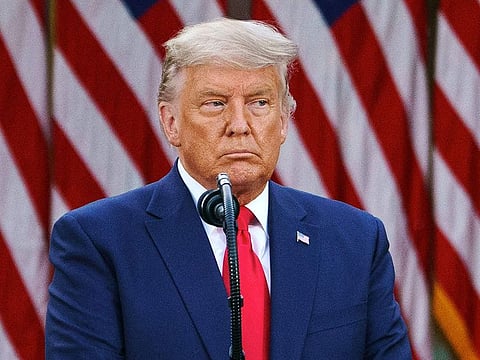DOJ rejects Trump's immunity argument in 2020 Election case
Justice Department filing responds to one by Trump to the Court of Appeals in Washington

Former President Donald Trump isn't entitled to immunity when it comes to federal criminal charges alleging he conspired to illegally overturn the 2020 presidential election to remain in power, Special Counsel Jack Smith argued in a legal filing Saturday.
The Justice Department filing responds to one by Trump to the US Court of Appeals in Washington on Dec. 23, in which he claims immunity from prosecution because his actions before and during the Jan. 6, 2021 riot at the US Capitol were within the bounds of his official duties as president.
"The defendant lost the 2020 presidential election," Smith wrote in an 82-page brief to the court, which is considering whether Trump can be prosecuted. "Separation-of-powers principles, constitutional text, history and precedent all make clear that a former President may be prosecuted for criminal acts he committed while in office "- including, most critically here, illegal acts to remain in power despite losing an election."
Both sides are jockeying for the upper hand after the appeals panel agreed to expedite consideration of the case and hear arguments on Jan. 9, potentially followed by a decision within days. The losing side is expected to appeal to the Supreme Court "- which isn't required to take up the case.
Smith wants the matter resolved quickly in an effort to avoid delaying a criminal trial against Trump set to start on March 4. A federal district judge previously ruled that Trump does not have presidential immunity from prosecution. The trial judge overseeing the case has put it on pause until the immunity issue is resolved.
Smith methodically attacked Trump's arguments in the filing.
Presidents don't have immunity from criminal acts committed while they were in office, he argued, citing the pardon given to former President Richard Nixon.
"No historical materials support the defendant's broad immunity claim, and the post-Presidency pardon that President Nixon accepted reflects the consensus view that a former President is subject to prosecution after leaving office," Smith wrote.
Even if the court were to find that presidents could be immune to criminal prosecution for official acts taken while in office, Trump acted beyond the bounds of his official duties, Smith added.
Trump "is alleged to have conspired with private individuals and government officials to use fraudulent means to thwart the transfer of power and remain in office," Smith wrote. "Dismissal would be unwarranted because the indictment contains substantial allegations of a plot to overturn the election results that fall well outside the outer perimeter of official Presidential responsibilities."
Trump also argued the charges against him should be dismissed because they amount to double jeopardy after he faced impeachment for his actions in the days after the 2020 election. Trump further said he can't be prosecuted because he wasn't convicted by the Senate during his impeachment trial.
Smith said both of those arguments fail, pointing out that the criminal charges against Trump are different from the offenses brought against him during impeachment.
"The Impeachment Judgment Clause limits congressional sanctions for impeachment to removal and disqualification from office; it does not create a double-jeopardy prohibition that protects an impeached but not convicted officer from criminal prosecution," Smith wrote.
"Nor is the prosecution here barred by double-jeopardy principles," the special counsel said. "Because the only remedies available in the impeachment proceedings were removal and disqualification, the defendant was never previously placed in jeopardy. But even if he were, the indictment charges different offenses than were at issue in his impeachment."



